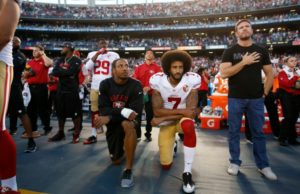Sports are an Acceptable Political Platform
October 16, 2017
For about one year now, the NFL and nation have been plagued by one question: should players use games to make political statements or protests?
The debate has especially become heated around whether these players should protest by not standing during the national anthem.
The protests many NFL players are taking part in was started in the 2016 season by then quarterback of the San Francisco 49ers, Colin Kaepernick, who sat and kneeled during the national anthem to not, “Show pride in a flag for a country that oppresses black people and people of color.” His protests were launched in an attempt to help change systemic racism and police brutality in the United States.
The protests have spread throughout the NFL, with players from almost every team participating, including many Broncos players such as Von Miller, Demaryius Thomas, and Brandon Marshall.
Kaepernick, under the First Amendment, is fully justified in his protest. It is within his rights to express his opinions. His protests are not harmful to others, obscene, defamatory, direct threats, or government secrets, the only forms of free speech that are not covered by the first amendment.
However, many people, including President Trump, have complained that this protest is wrong on several levels. They see his actions as direct disrespect to both the flag and the armed services. Many others believe that professional sports, or really any type of athletics, are the incorrect platform for politics. Still others complain that, as a multimillionaire, Kaepernick, as well as other NFL players have no right to complain about unjust treatment. After all, aren’t they all successful in this country?
The argument that players are disrespecting the flag has a few key problems. For one, Americans are not required to stand for the national anthem at any point, unless they are a part of the military. In fact the NFL only began requiring players to be on the field during the national anthem in 2009, thought they were only off the field previously during prime time games due to broadcasting time restraints. In many ways, the singing of the national anthem at sports matches is already a political statement. Why do privately owned and operated sports leagues have any nationalistic shows of loyalty and patriotism? Not every American loves their country, and not everyone supports the military. Thus, the incorporation of the national anthem into these private events is already forcing a political ideology on everyone in the stands. While Kaepernick’s protest is political, it is arguably a reaction to an already political action during the game.
In addition, Kaepernick and others have decided to kneel rather than sit during the anthem in order to convey their respect. Kaepernick even consulted former NFL player and Navy Seal Nate Boyer. Kaepernick’s former teammate Eric Reid commented that, “We chose to kneel because it’s a respectful gesture.”
As for athletics being the incorrect platform for politics, that may be a bit true. Professional sports are meant to be focused on the game and skillset of the athletes, teams, and coaches. They also serve as a way to unite the country rather than divide it. If we follow that logic, maybe actors should also cease to be politically active. Maybe any and all public entertainers (and that is what in many ways, professional athletes are) should keep themselves from expressing the political views and using their fame to spread a message. That may make it easier to watch shows and movies and may bring people closer to one another, but it is also grossly unrealistic. When given a public platform and a wide audience, many people will try to spread their ideas. By trying to control this, we would be unrealistically limiting the voices of athletes. Limiting their free speech in this way is unjust to them as citizens of this country and unilaterally doing so could also result in other actual concerns of theirs being ignored. If this protest is stopped, protests over concussions and other issues plaguing these players may be suppressed.
This protest is also hardly distracting from the game. It takes place before kickoff and only lasts a few minutes at the most. It’s nearly impossible to correlate such a small segment of time and a player’s poor performance. A wide receiver won’t miss the ball just because he is taking part in a protest. It’s his job to catch the ball. An accountant won’t suddenly forget all of their training if they take part in a protest, so why would a professional athlete suddenly lose their skills by kneeling during the anthem?
Finally, these players have been labeled as out of touch, especially since many of them are wealthy and seemingly unaffected by the pervasive systemic racism in the United States. However, they still had to grow up in this country, encountering all of the racist obstacles thrown at them. For every player, there are thousands still languishing who never could catch that break. They are some of the only prominent public figures who have a large audience and an opportunity to express themselves and are also African American. It is true that a poor person will more likely be encountering racism every day, but they lack a proper platform for protest.
It all ties back to a greater problem in this country. Deep systemic racism has caused an inequality even in protest. This country has made it exceedingly difficult for African Americans to have a strong public platform, and when they do and use that platform, they are labelled as divisive and unpatriotic. These protests are important and about a major problem in our country, and silencing them not only violates the First Amendment, but also continues to perpetuate the problem of silencing minority protest in this country.

